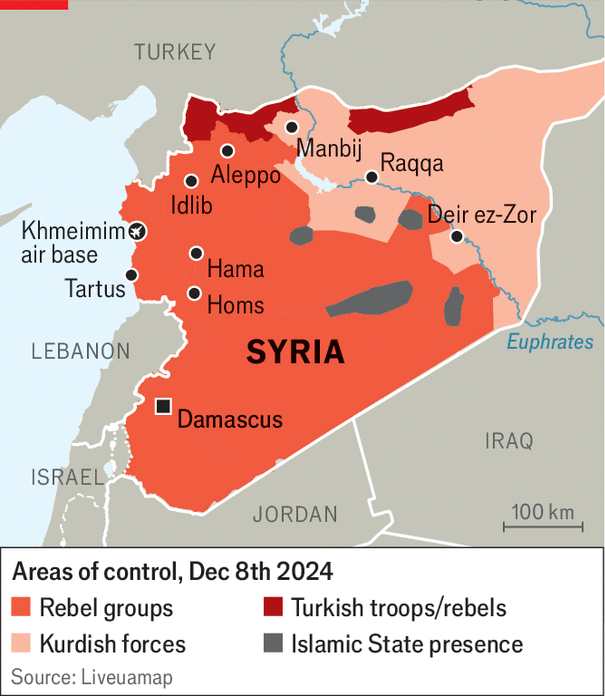 Map: The Economist
Map: The Economist
Syrians are hoping for a peaceful transition of power. They may not get it, writes ‘The Economist’.
In Damascus and across the country, Syrians were cheering a fresh start and a reboot of their relations with the world.
What kind of fresh start will they get? Much depends on whether Syria’s multi-pronged opposition, suddenly bereft of its common enemy, will band together to form a pluralist, federal civilian government over all of Syria, or descend into infighting that plunges the country into a new civil war.
The rebels, foremost among them Hayat Tahrir al-Sham, a former al-Qaeda (banned in RF) affiliate that has ruled a slice of north-western Syria for the past few years, say they have learnt the lessons of past regime changes in the Arab world. Unlike in Iraq and Libya, the transition is being managed locally, rather than by foreign powers and returning exiles. Russia and Iran, previously Mr Assad’s main backers, have retreated into the shadows.
But things in Syria have a habit of getting complicated. The de facto partitioning of Syria that took place under Mr Assad has intensified since his fall. Rebels from the north, east and south of the country co-ordinated their takeover with remarkable discipline in recent days. Yet because Mr Assad’s regime collapsed far faster than they expected, they have not had time to plan for the day after. Each of the four main factions — Turkish-backed Sunni rebels in the north-west, Kurds in the north and east, Jordanian-backed rebels in the south, and the remaining loyalists from Mr Assad’s Alawite sect in the west — has its own army. All of them have been bolstered by the weapons, land and economic holdings seized from the Assads in recent days. Each group will want its share of the spoils and a slice of whatever package is arranged to reconstruct the devastated country, with needs estimated to cost some $200bn.
Within hours of Mr Assad’s fall, the fragile truce between the different groups had begun to break down as fighting flared at Manbij, on the line dividing Turkish-backed Arabs in the north-west from the Kurds in the north-east. Syrians have not forgotten that the toppling of Iraq’s and Libya’s strongmen triggered a decade of civil war between their would-be successors. Nor are they unaware how tricky it will be to manage relations with their neighbours.
Whoever takes charge in Damascus will have trouble controlling all of Syria. In the north-east, the Kurds will look to the few hundred American troops stationed there to thwart efforts to bring the lucrative oilfields, Syria’s breadbasket and the Arab cities they rule back under central control. In Manbij and Raqqa, they are already fighting Turkish-backed forces to preserve the autonomy they carved out under Mr Assad. Huddled in mountain villages above the Mediterranean coast, Mr Assad’s sect, the Alawites, will similarly have to decide whether to fight or accept Sunni-majority rule. In addition to the heavy weapons salvaged from the regime’s rout, they may also look to protection from Russia, which still keeps a naval and airbase there that it may hang on to, subject to negotiation with Turkey and Syria’s new rulers.
Civilians in the exiled political opposition in Istanbul, in Turkey, seem to have been sidelined for now. According to a un roadmap agreed in 2015, the Syrian Negotiation Commission is supposed to oversee the opposition’s role in Syria’s transition. It is mandated to help draw up a new constitution, prepare for elections in 18 months and integrate Syria’s many militias into an army reflecting the country’s ethnic and religious groups. But the forces on the ground appear in no hurry to step aside.
After 13 years of civil war and penury, an exhausted population is praying for a peaceful handover that has proved vanishingly rare in the Arab world. With so much division inside and outside Syria, consensus will be hard to find.
read more in our Telegram-channel https://t.me/The_International_Affairs

 12:33 11.12.2024 •
12:33 11.12.2024 •






















